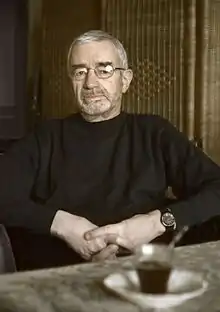
Ádám Bodor
Ádám Bodor (born 22 February 1936 in Cluj) is a Hungarian author of Transylvanian Hungarian origin.
Life and writing
Bodor was born in Romania to a staunchly anti-communist father and was himself an anti-communist. In his youth he believed in Transylvanian independence and overthrowing the Communist state.[1] At seventeen he was arrested by the Securitate.[2] After being freed he studied at a Calvinist seminary and began writing. After this he left Romania for Hungary and then spent some time in the West.[3] Several of his works have been adapted to film.
Bibliography
- A tanú (1969)
- Plusz-mínusz egy nap (1974)
- Megérkezés északra (1978)
- Milyen is egy hágó? (1980)
- A Zangezur hegység (1981)
- Az Eufrátesz Babilonnál (1985)
- Sinistra körzet (1992). The Sinistra Zone, trans. Paul Olchváry (New Directions, 2013)
- Vissza a fülesbagolyhoz (1992)
- Az érsek látogatása (1999)
- A börtön szaga. Válaszok Balla Zsófia kérdéseire. Egy korábbi rádióinterjú változata (2001)
- A részleg (2006)
- Az utolsó szénégetők. Tárcák 1978–1981 (2010)
- Állomás, éjszaka. Tízkezes egy Bodor novellára (2011)
- Verhovina madarai (2011). The Birds of Verhovina, trans. Peter Sherwood (Jantar, 2021)
- A barátkozás lehetőségei (2016)
- Sehol (2019)
- Az értelmezés útvesztői. Tizenöt beszélgetés (2021)
References
- ↑ "Ádám Bodor — internationales literaturfestival berlin". www.literaturfestival.com. Retrieved 11 November 2017.
- ↑ Segel, Harold B. (11 November 2017). The Columbia Literary History of Eastern Europe Since 1945. Columbia University Press. ISBN 9780231508049. Retrieved 11 November 2017 – via Google Books.
- ↑ World Literature Today, Volume 76, No. 2
This article is issued from Wikipedia. The text is licensed under Creative Commons - Attribution - Sharealike. Additional terms may apply for the media files.